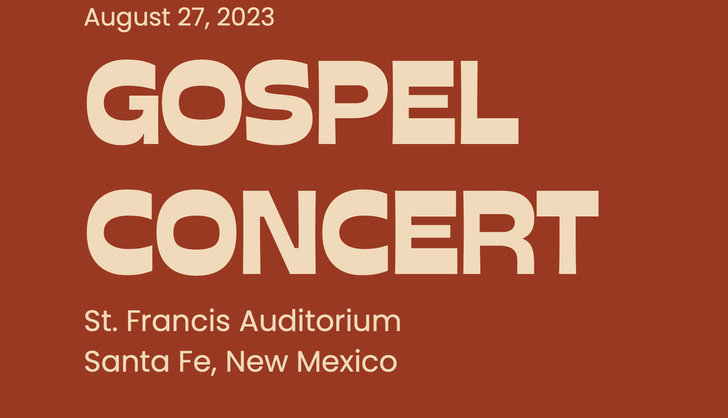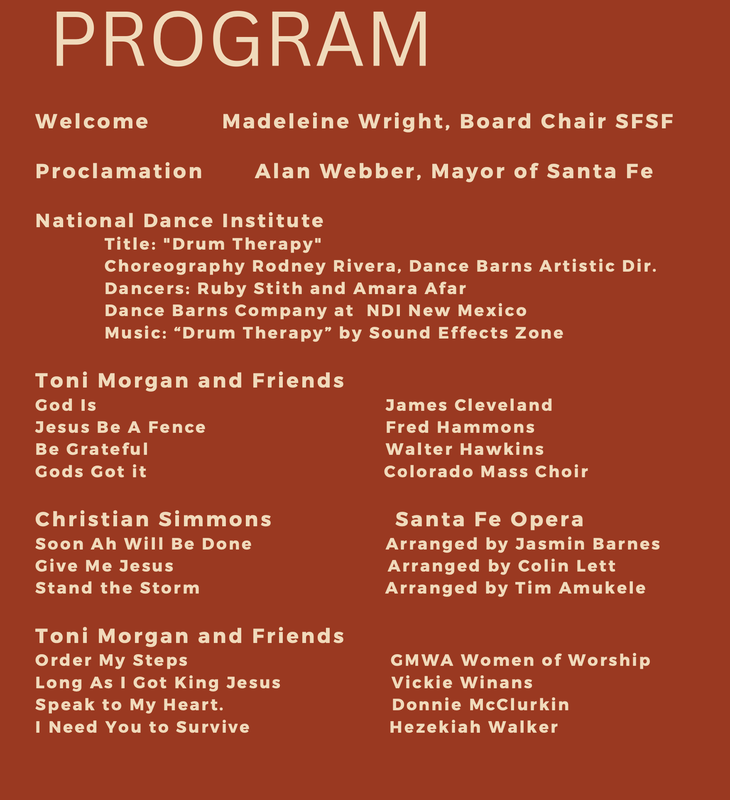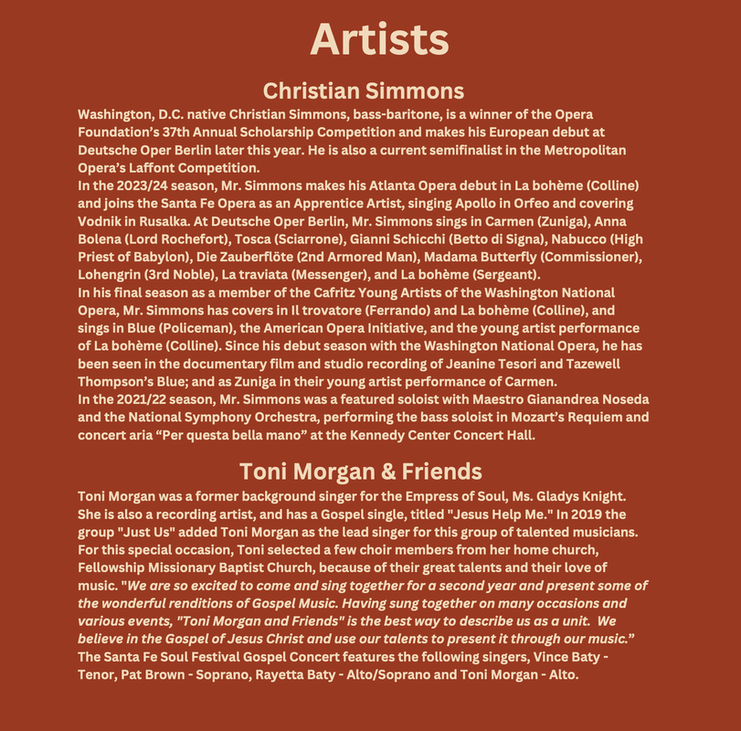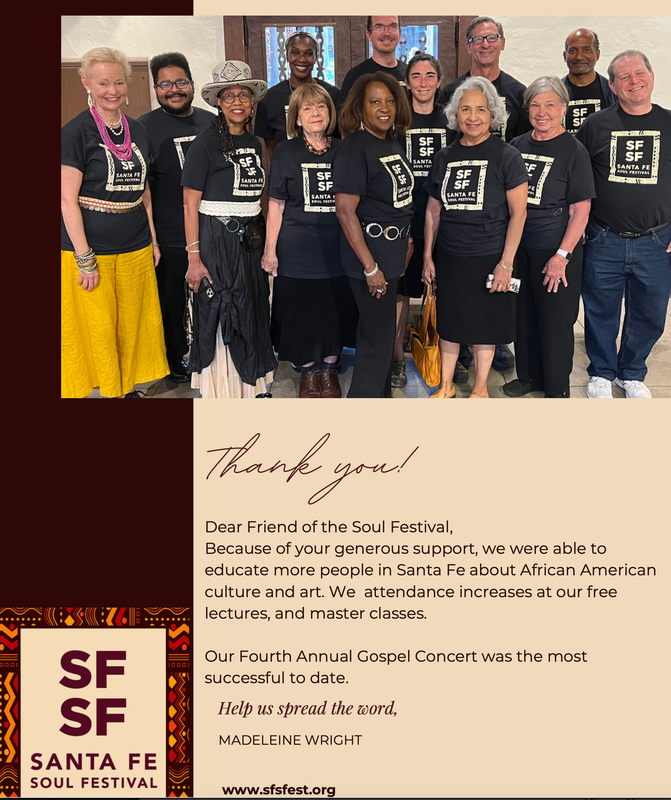SOUL RHYTHMS
A lecture demonstration and jam session with
DOUGLAS CARDWELL, Principal Timpani Chair with the New Mexico Philharmonic.
FREE!
Saturday August 26
3:00-4:30
First Presbyterian Church, Santa Fe
Bring a drum or other percussion instrument.
$100 cash prize for the most creative drum!
A lecture demonstration and jam session with
DOUGLAS CARDWELL, Principal Timpani Chair with the New Mexico Philharmonic.
FREE!
Saturday August 26
3:00-4:30
First Presbyterian Church, Santa Fe
Bring a drum or other percussion instrument.
$100 cash prize for the most creative drum!
PICNIC AND DANCE
Free
In cooperation with the First Presbyterian Church
SUNDAY, JUNE 18, 2023, 11:00-1:00
Federal Park, Santa Fe
Today’s Guests
Today we are delighted to have the following guests:
History Note
Although the Emancipation Proclamation took effect on January 1, 1863,..."not everyone in Confederate territory would immediately be free. Even though the Emancipation Proclamation was made effective in 1863, it could not be implemented in places still under Confederate control. As a result, in the westernmost Confederate state of Texas, enslaved people would not be free until much later. Freedom finally came on June 19, 1865, when some 2,000 Union troops arrived in Galveston Bay, Texas. The army announced that the more than 250,000 enslaved black people in the state, were free by executive decree. This day came to be known as "Juneteenth," by the newly freed people in Texas.
The post-emancipation period known as Reconstruction (1865-1877) marked an era of great hope, uncertainty, and struggle for the nation as a whole. Formerly enslaved people immediately sought to reunify families, establish schools, run for political office, push radical legislation and even sue slaveholders for compensation. Given the 200+ years of enslavement, such changes were nothing short of amazing. Not even a generation out of slavery, African Americans were inspired and empowered to transform their lives and their country.
Juneteenth marks our country’s second independence day." (From The Historical Legacy of Juneteenth, Smithsonian National Museum of African American History and Culture.)
Free
In cooperation with the First Presbyterian Church
SUNDAY, JUNE 18, 2023, 11:00-1:00
Federal Park, Santa Fe
Today’s Guests
Today we are delighted to have the following guests:
- Santa Fe Soul Festival master dance teacher Deollo Johnson will lead line dancing. He will be introduced by Madeleine Wright, an SFSF Board member.
- Zimbabwean Marimba for All master teacher Karyna Swing will bring musical instruments and invite us all to join in the music—all in the spirit of fun and keeping this ancestral African music alive. She will be introduced by Elise Packard, a member of the band.
History Note
Although the Emancipation Proclamation took effect on January 1, 1863,..."not everyone in Confederate territory would immediately be free. Even though the Emancipation Proclamation was made effective in 1863, it could not be implemented in places still under Confederate control. As a result, in the westernmost Confederate state of Texas, enslaved people would not be free until much later. Freedom finally came on June 19, 1865, when some 2,000 Union troops arrived in Galveston Bay, Texas. The army announced that the more than 250,000 enslaved black people in the state, were free by executive decree. This day came to be known as "Juneteenth," by the newly freed people in Texas.
The post-emancipation period known as Reconstruction (1865-1877) marked an era of great hope, uncertainty, and struggle for the nation as a whole. Formerly enslaved people immediately sought to reunify families, establish schools, run for political office, push radical legislation and even sue slaveholders for compensation. Given the 200+ years of enslavement, such changes were nothing short of amazing. Not even a generation out of slavery, African Americans were inspired and empowered to transform their lives and their country.
Juneteenth marks our country’s second independence day." (From The Historical Legacy of Juneteenth, Smithsonian National Museum of African American History and Culture.)
On February 13, 2023, in honor of Black History Month, the Santa Fe Soul Festival sponsored a dance class during assembly for the entire student body of the New Mexico School for the Arts in Santa Fe. Board President Madeleine Wright gave an inspiring keynote speech and had made Kente cloth sashes to give to everyone before the dance. It was a great success from start to finish!
Many thanks to the following who made it such as success:
Shayla Patton, Theatre teacher/ArtReach Coordinator, New Mexico School for the Arts
Tracey Whitney, jazz vocal mastery instructor, New Mexico School for Arts
Deollo Johnson, dance teacher
Fred Simpson, drummer
Nfaly Drame, drummer
Mohamed Bako Camara, drummer
And a shout out to the student announcers:
Ahmia TamaPovi
Tula Campbell
Shaunti Sitonick
Gibraltar Pharell
Many thanks to the following who made it such as success:
Shayla Patton, Theatre teacher/ArtReach Coordinator, New Mexico School for the Arts
Tracey Whitney, jazz vocal mastery instructor, New Mexico School for Arts
Deollo Johnson, dance teacher
Fred Simpson, drummer
Nfaly Drame, drummer
Mohamed Bako Camara, drummer
And a shout out to the student announcers:
Ahmia TamaPovi
Tula Campbell
Shaunti Sitonick
Gibraltar Pharell
Summary of Board President Madeleine Wright's keynote speech:
The colors in Ghanian Kente cloth (red, black green and gold) are used in carnival celebrations in Brazil, the Caribbean and the Black Liberation flag. Congo Square in New Orleans was exceptional in the United States for enslaved people could gather, dance and play African rhythms. Wynton Marsalis was born in New Orleans and has promoted Jazz through Jazz at Lincoln Center. In addition to being one of the most awarded trumpeter, Marsalis’s life is characterized by excellence, humility, generosity and gratitude.
The colors in Ghanian Kente cloth (red, black green and gold) are used in carnival celebrations in Brazil, the Caribbean and the Black Liberation flag. Congo Square in New Orleans was exceptional in the United States for enslaved people could gather, dance and play African rhythms. Wynton Marsalis was born in New Orleans and has promoted Jazz through Jazz at Lincoln Center. In addition to being one of the most awarded trumpeter, Marsalis’s life is characterized by excellence, humility, generosity and gratitude.




